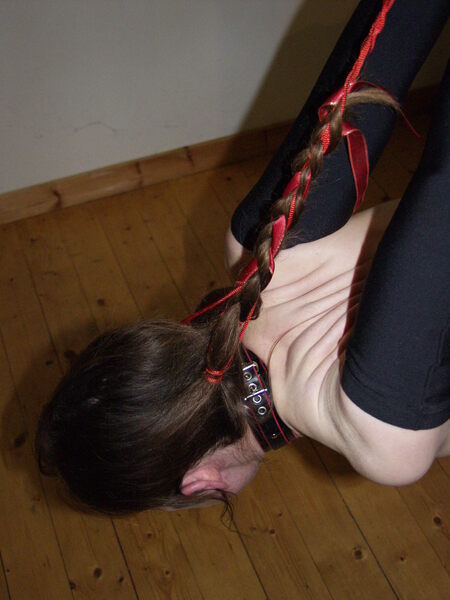On the Semiotics of the Collar

I was talking about my lover (who I'll refer to as Tac, although that isn't her name) to a friend the other day, and my friend said to me "oh, the girl who wears the collar." It rocked me, and it led to some introspection.
Since the major breakdown I had in 2009, when I decided to acknowledge and embrace my sadism, every woman I've had sex with — every lover — has worn a collar. She's worn a collar because I, in my arrogance, have put it on her. And if she refused to wear it? Then we didn't continue as lovers.
Repression and the Anonymous Candelabra
On the 30th of July, the Anonymous Candelabra and I made an image. Our friend Delilah photographed it, but we made it. And although it's in many ways imperfect, I'm enormously pleased with it: there is so much semiotic content in it in so many layers, and it says so much of what I wanted it to say.
The first thing is a bit meta, and you can't immediately see it in the image (although when I tell you about it you will probably pick out the signs). It is this: the image is a fake. I prepared for this photograph in a hurry, because the people who could help me with it were present; and consequently, I didn't tidy up the room carefully enough. In the photograph as it was taken, there's a very noticeable cat bowl immediately to the right of the Candelabra's head, and a very noticeable log basket immediately to my left.
Scottish Government Land Reform consultation meeting Langholm
These are notes written during the public meeting, called by Scottish Government, held in the Buccleuch Centre, Langholm, on the evening of 20th July 2022 to discuss the consultation 'Land Reform in a Net Zero Nation'.
Platform
- Màiri McAllan MSP, Scottish Government
- Lorna Slater MSP, Scottish Government
- Lorne MacLeod, Scottish Land Commission
- Janet Mountford-Smith, Scottish Government, civil servant leading work on the bill
- Jenny Barlow, estate manager (nature reserve on the Langholm Moor buyout)
It's time tae rise as levellers again -- Updated
This is an update of an essay first published on Thursday, 9 May 2013, to account for things which have actually changed in the interim
If you follow this blog, you know already that I am an essayist; you know I'm not a poet. So here is an essay. It's an essay that has been boiling up in me for weeks, and I've been trying to do the background research I need to support it. I haven't fully succeeded in that. There hasn't been time. But now the iron is hot, and I must strike. So here it is: an essay.
Defence of the Good Society
Violence, for any purpose, but perhaps especially for imposing the will of one group of people on another, is an evil; an evil that must be anathema to a good society. But the problem of evil exists and will not go away because we will it so. As I write this, the Russian army is rolling very slowly, and at enormous cost, forward across Ukraine, crushing under its weight thousands of people and at least hundreds of thousands of homes. Behind that advance it trails an exceedingly bad — an exceedingly violent and repressive — society.
Ukraine is not a 'good society' in the sense of this essay, but it's not a bad society. On the contrary, it is a society which aspires to be better and before this unprovoked orgy of violence was making progress towards being better. Indeed, it's probably because it was making progress — making its people both freer and more prosperous — and because that relative prosperity and freedom contrasted sharply with the conditions of the people of Russia across the border, that the Russian elite considered it a threat.
The good society would be extremely free. And while, in absolute terms, it would probably produce less material goods than a capitalist society, nevertheless, because it would share those goods it had much more equitably, its people would be adequately prosperous. Thus, by existing, it would provide an exemplar to the people of less good societies that things could be different, and, by that means, it would constitute a threat to the rulers of those less good societies which sought to keep them less free and to concentrate prosperity into their elites.

